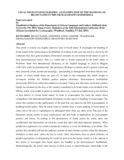Please use this identifier to cite or link to this item:
https://cris.library.msu.ac.zw//handle/11408/568| Title: | Legal issues in lexicography: an examination of the handling of brand names in the isichazamazwi sesindebele: Paper presented at the 16th International conference of the African association for Lexicography, Windhoek, Namibia, 5-7 July 2011 | Authors: | Maphosa, Mandlenkosi | Keywords: | Brand names, generification, generic Isichazamazwi sesindebele |
Issue Date: | Jul-2011 | Publisher: | Midlands State University | Abstract: | This article is centred on a legally explosive issue of brand names. It investigates the handling of brand names in the Isichazamazwi SesiNdebele. In looking at this issue the article is driven by the realisation that most general purpose dictionaries normally do not include brand names as part of their macrostructural entries. This is a reality that is vividly expressed by the Chief editor of Webster's Third New International Dictionary of the English language as cited by Higgins (1997:381) where he proclaims that “this dictionary [Webster's] confines itself to generic words and their functions, forms, sounds and meanings... [presumably as distingushed from those that are nongeneric of which brand names are part of]. In light of this realisation this article sought to investigate whether the Ndebele general purpose dictionary, Isichazamazwi SesiNdebele (henceforth, ISN) lived within this tradition or deviated. Taking note that some words that could be legally (as informed by the laws of the country) considered to be brand names were included in the ISN the article went further to probe on whether there was a rational scientific basis in the selection or lack thereof of certain brand names. In order to contextualise the study the article draws comaprisons with International English dictionaries on this aspect of handling of brand names. The article then ponders on the ramifications of the path that was taken by the ISN lexicographers in handling brands names. Thus the article looks at whether there is some marking of brand names of some sort or the use of capitalisation to distinguish them from any other word. This part of the discussion mostly dwells on legal ramifications and also looks at implications for lexicographic practice and theory. In looking at the phenomenon of brand names the article takes into consideration that dictionaries are reference works that carry with them immense authority. When people have arguments over certain concepts the tendency is to use the dictionary as an arbiter. This practice has extended well into the judiciary systems of many literate societies where the dictionary definition in most cases carries the day in courts. Since dictionaries have so much influence on people's perceptions on interpreting the world (at least from the literary realm) it is the interest of this article to investigate how brand names are handled in the Isichazamazwi SesiNdebele. Methodologically, the article relies heavily on desk review of related literature which helps in the understanding of the primary source, the ISN. However, the research does not lose sight of the importance of getting first hand information from the authors of the dictionary under spotlight which explains the use of interviews with senior editors (the chief editor and the deputy chief editor) to try and get their views on why they took the steps they took and to establish whether they were aware of the legal ramifications, i.e. Whether the inclusion or exclusion of certain brand names was an expression of their opinion on proprietary rights. In examining the dictionary vis a vis the treatment of brand names the article does not lose sight of the actual linguistic behaviour of the Ndebele linguistic community vis-a vis its treatment of brand names in everyday discourse. In view of this, the study also sort views from the speakers of the Ndebele language, who are also the target users of the ISN. This was done through a structured questionnaire where the respondents were given ten defintions of unidentified lexical items and they were asked to provide possible lexical items for those definitions. This was a strategy to test on the status of the so called brand names/trademarks, at least from the viewpoint of the ordinary speakers of the language. Thus the assumption was that if a significant number of the users identified a brand name as the missing lexical item for the definition provided then that could be used as a pointer to the generification of that particular brand name. | URI: | http://hdl.handle.net/11408/568 |
| Appears in Collections: | Conference Papers |
Files in This Item:
| File | Description | Size | Format | |
|---|---|---|---|---|
| legal and ethical issues in lexicography_Maphosa Afrilex 2011[1].pdf | 104.22 kB | Adobe PDF |  View/Open |
Page view(s)
334
checked on Feb 25, 2026
Download(s)
112
checked on Feb 25, 2026
Google ScholarTM
Check
Items in MSUIR are protected by copyright, with all rights reserved, unless otherwise indicated.



